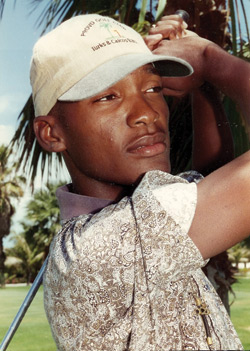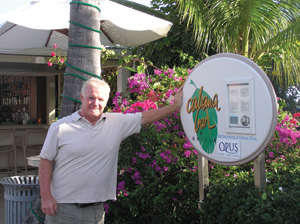
Rodney Lavard thought he’d heard it all before. The 19-year-old clubhouse attendant at the only golf course in the Turks and Caicos Islands was used to hearing “resort talk” from vacationers. But what Lavard heard on this day was different. This felt almost cruel.
Natives of Providenciales, the most inhabited of the Turks and Caicos Islands, know they shouldn’t take too seriously what a vacationer says while staying for even the shortest period of time near Grace Bay Beach. This stunning 12-mile stretch of white sand and turquoise water can make one a little giddy. Caught up in the sheer beauty of one’s surroundings, an island newcomer tends to say things one normally wouldn’t promise.
When a golfer from the states said he was going to send Lavard a scholarship application, Lavard flinched. Then he did what he had always done in the past—he smiled and nodded. The vacationer had no way of knowing that this extreme form of resort talk would hit Lavard like a thunderbolt. The singular thought of going to college was at the very heart of Lavard’s hopes, dreams and aspirations to get ahead.
What if…
But what if the vacationer was telling the truth? What if this resort talk could change Lavard’s life forever?
Lavard would soon learn that this lingering exchange was more than just talk. Mere weeks after the scholarship conversation occurred, Lavard was summoned to the Provo (short for Providenciales) Golf Club office. Lavard’s boss handed him a Federal Express package with his name on it. Lavard wasn’t used to receiving mail, let alone a package. On the day his life would reach a tipping point, Lavard opened the package with the potential to unleash his dreams.
“Inside the envelope was a golf scholarship application for Southern University in Baton Rouge, Louisiana,” Lavard said. “The first thing I did was look for a map. I had never been to the United States and had no idea where Louisiana was.”
The whole idea of a scholarship and going to college came at Lavard like a rush. He wasn’t like every other college kid. If he were to pursue college, there was some unraveling he needed to do. The history of his tumultuous life would need to be sorted out. Would college even be possible or was he kidding himself?
Rodney Kenny Lavard was born in Haiti’s capital city of Port au Prince in 1976. With an average annual household income of approximately $1,000 per year, the people of Haiti toil in an economy that is ranked annually as one of the poorest in the world. The financial status of the Lavard family leaned toward the low end of this scale.
A family torn apart
At the age of four, Lavard’s family was literally fractured in half. In search of work, his father moved his wife and four boys with him to Providenciales. Shortly thereafter, Lavard’s parents divorced. After living for a brief period back in Haiti with his mom and brothers, Lavard’s grandfather sent him, and his older brother Bobby, back to Providenciales. He would never see his mother again.
The Lavards spent the next several years scratching out an existence in Providenciales. During this time, Lavard’s already tough childhood took yet another wicked turn. “We woke up one morning to learn my Dad had left,” Lavard said. “He moved to Miami in search of construction work. I was 10 years old and Bobby was 12. My dad’s girlfriend was in charge of taking care of us,” he continued.
Six months into this arrangement, his father’s girlfriend changed her mind regarding caring for the boys and decided to leave them. Lavard and his brother were now left to fend for themselves.
Lavard’s father left two thought-provoking legacies ingrained in his boys’ minds. The most important was: “You have to go to school.” The other was to recognize the value of hard work. So, the two boys survived in Providenciales while leading what could be considered a dual life. By day, they attended school. After school, they worked construction.
The Lavard boys earned $3 per hour in jobs ranging from mixing concrete, to plastering walls and laying tiles. This work generated enough cash to pay for what Lavard refers to as a “four-by-four shack” in the Blue Hills neighborhood of Providenciales. Minus electricity and plumbing, this shack was sturdy enough to withstand Hurricane Kate’s 110-mph winds in the mid 1980s.
Eventually, Lavard encountered a problem at school when one of his teachers asked him why his father never attended parent conference meetings. A classmate of Lavard’s blurted out, “That’s because Rodney’s father abandoned him two years ago.” The Lavard boys’ situation was forwarded to the Turks and Caicos government, but the island didn’t have foster care at the time. This problem was temporarily averted when Roy Chadband, one of Lavard’s teachers, offered the boys room and board in his apartment.
Aside from their new address, not much changed for the boys. They attended school each day and worked construction in the evening. This routine continued until Lavard graduated from Clement Howell High School at the age of 16 in 1992.
A life changing choice
In 1993, Lavard began applying for jobs throughout Providenciales. He eventually narrowed his job choices to two—a clubhouse job at the brand new Provo Golf Club and a job at an insurance company.
“The man at the insurance company said I would never succeed in golf,” Lavard recalled. “He said that golf is a white man’s sport. I never cared for someone telling me I couldn’t do something, so I chose the golf job.”
When Provo Golf Club opened in 1992, the course became a real source of curiosity on the island. Most of the island natives had barely heard of golf. Even most of the expatriate audience, who had found refuge along Grace Bay Beach, seemed to find the sport foreign. The course’s lush Bermuda grass is what really captivated the attention of many on Providenciales.
The Turks and Caicos Islands consist of 40 islands and cays, of which only eight are inhabited. The island terrain is mostly limestone and the arid Caribbean climate produces approximately 25 inches of rainfall annually. Because of the dry climate, green grass is in short supply in Providenciales. Therefore, the new golf club and its beautifully manicured lawn became a popular spot for weddings and family events.
The second curious aspect of Provo Golf Club was the sport of golf itself. Shortly after the course opened, golf balls began vanishing from the grounds and the pro shop shelves. Peter Boyce, Provo’s first golf professional, recalls, “I started seeing golf balls showing up on the end of key chains all around town.”
At approximately the same time Lavard began working at Provo Golf Club, he also secured another job at Grace Bay’s newest resort, Club Med. Lavard’s evening work at Club Med proved to be both a blessing and a curse for a young man with an eye for the ladies. Lavard’s disc jockey position at Club Med’s nightclub was the ultimate door opener for meeting female guests. However, the late nights on Club Med’s dance floor weren’t very compatible for someone who needed to start work at the golf course at 5 a.m. Boyce, Lavard’s boss at Provo Golf Club, told Rodney that if he didn’t start arriving on time, he would be fired. Lavard found a simple solution to this problem.
“After dancing all night at Club Med, I would drive across the street to Provo Golf Club and park my car,” Lavard said. “I would position myself next to where Peter Boyce always parked his vehicle in the morning. When Peter arrived for work, he would tap on my car window until I woke up.”
Lavard eventually gave up his extracurricular activities at Club Med and began dedicating himself entirely to his work at the golf course. “Rodney was a natural for greeting guests when they arrived at the course,” Boyce said. “His charm and easygoing personality made him the perfect person for welcoming newcomers and getting them set up prior to a round of golf. Rodney became one of our key people at Provo.”



I have followed Rodney’s story since meeting Dot and Irv Lyles many years ago. They were so proud of him! I am so happy this story has been told in such a wonderful way. Dot has continued to talk him up every time we speak and rightfully so. Keep your great success story running Rodney. Grreat article.
Wow!!! Great job Tim on telling a story that captivated me some 13 yrs ago. When I met Rodney on Southern University golf team I always knew he would be victorious in anything he put his mind too. He has that special drive and attitude that all the successful ones have in order to achieve greatness. His story should be a testament to all those who don?t believe hard work and perseverance pays off. Remember to always have hope and keep faith.
Rodney I wish you much continued success.
Sincerely,
Brad (TCB)
great article Tim – you have a gift!
What a great story. There seems to be a lot of great heart wariming stories when it comes to golf. There are many life lessons that Golf teaches. Patience is at the top of the list.
This story moved me “at the core.” It was very inspirational. Rodney is the epitome of endless persistence, a strong work and having the courage to pursue his dreams!
I played on Rodney’s golf team at Southern University. He is and always has been a stand up guy (golf and in life). I am happy I got to meet such a wonderful person.